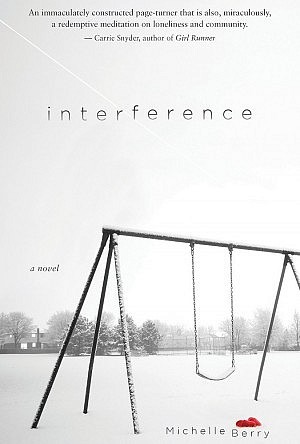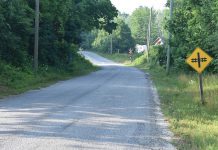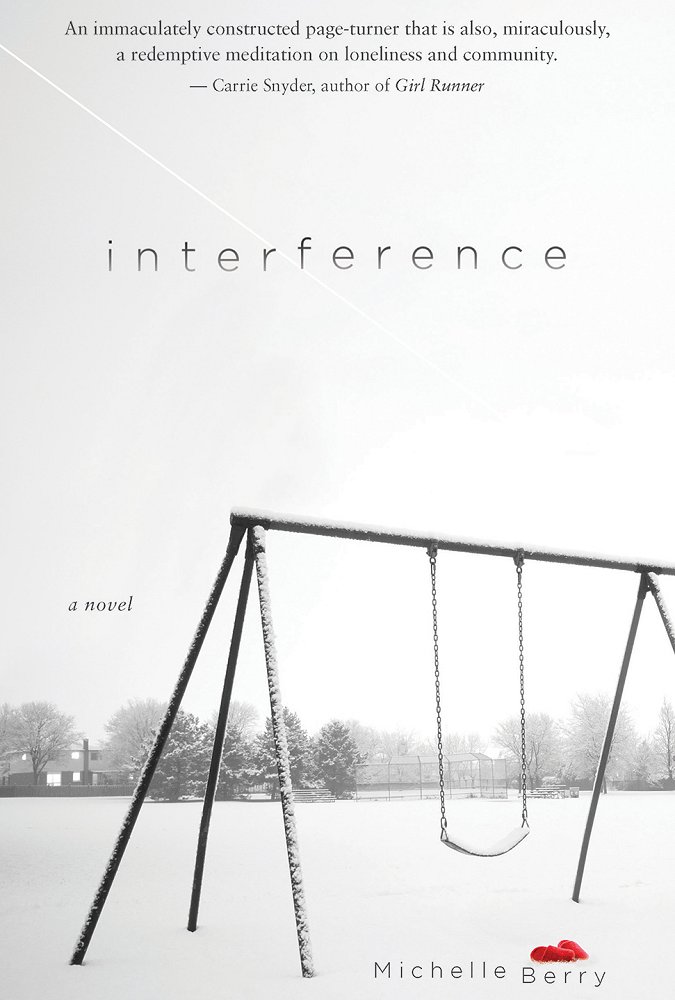Michelle Berry is widely published in Canadian literary magazines, national newspapers, and anthologies. She teaches creative writing at both the University of Toronto and Trent University, and she is a mentor at Humber College.
In addition to her latest novel, Interference, Michelle has written four other novels (What We All Want, Blur, Blind Crescent, and This Book Will Not Save Your Life) and has published three collections of short fiction (How To Get There From Here, Margaret Lives in the Basement, and I Still Don’t Even Know You ).
This Book Will Not Save Your Life won the 2010 Colophon Award and was longlisted for the 2011 ReLit Award and I Still Don’t Even Know You won the 2011 Mary Scorer Award for Best Book Published by a Manitoba Publisher and was shortlisted for the 2011 ReLit Award.
Born in California and raised in Victoria, British Columbia, she lives with her family in Peterborough.
Interference was published in August 2014 by ECW Press. You can buy the paperback version of Interference onlne at Chapters Indigo and Amazon or as an e-book for Kobo and Kindle.
Note: A celebratory book launch for Interference takes place from 7 to 9 p.m. on Tuesday, September 9th at the Sapphire Room (137 Hunter St. W., Peterborough). See our event listing for details.
FALL

This morning we became aware of an incident that occurred at another school earlier this week. We are forwarding this information to you, because we know you need to be aware of what is going on and we need to have an open dialogue between staff and parents. We have found that if we don’t have this kind of discussion some of our parents get very upset. Last year’s incident with the ice cream and the hermit crabs was just such an example of this.
Local police indicate that a man approached a twelve-year-old girl in front of our sister school, Markwell Elementary, on Lee Boulevard. Somehow avoiding the mother-monitors, this man was lingering around when the bell rang for dismissal. The student swears that she does not know the man, and when he asked her if she wanted a ride home she said no. He walked away and left the girl alone. He didn’t seem to be in possession of a vehicle. The man is described as “old” by the girl. We assume that means that he is somewhere between the ages of twenty and sixty. The girl also stated that he was a few inches taller than her — this would put him at around five feet, five inches tall. She said he had a small build and short, brown hair, balding on the top. He was wearing a dark green trench coat over a brown suit. He had a nervous manner about him and kept repeating himself. Police are continuing their investigation into this matter. They ask if any of you have information to please call Crime Stoppers.
We must all congratulate this anonymous twelve-year-old for her forward and rational thinking. Not only did she say no to the man when he asked her if she wanted a ride, but she also was aware enough to get a good look at him and report him to the police.
Safety among our students is always our top priority. Our staff will keep their eyes open in the schoolyard. They will be vigilant. We have ordered new walkie-talkies in order to communicate with the office if the teachers see anything out of order. Triple AAA batteries would be appreciated if you have any to donate. Please review all the safety rules you can think of with your children. This includes walking with another child and telling an adult immediately if someone makes them feel uncomfortable. Consider deciding on a secret word that only you and your child know in case someone says that you sent them to pick up the child.
Please feel free to call me with any questions or concerns.
Sincerely,
Marge Tanner
Principal, Oak Park Elementary School
Tom and Maria are busy raking the leaves. Tom is by the side of their front porch. Maria is out near the sidewalk. Their daughter, Becky, is playing across the street with her friend Rachel and the sky is full of white billowy clouds. The new woman who recently moved into the empty place beside Rachel’s house pulls her car into her driveway, unbuckles her baby from the back and walks into her house. Tom stops raking to admire her blond hair, California-blond, bleached-out but still healthy looking, which is ironic. But isn’t everything from California ironic, Tom thinks. Tom knows he’d never have noticed the hair, or at least the health of it, the blond of it, the irony of it, if Maria hadn’t commented on it. They haven’t introduced themselves to this new neighbour yet, but Tom and Maria watch her and Tom assumes, because of this, that they know a lot about her. The other neighbours have said things. Rachel’s mother, Trish, has mentioned her. They know her name is Dayton. Dayton from California living now in Canada. The baby is Carrie, which reminds Tom of the Stephen King movie, of pig’s blood and periods, of a hand coming out of a grave. That movie made Tom uncomfortable. Who would name their child Carrie? Someone named Dayton, he supposes. Tom sighs. Although that’s such an old movie now, Dayton might not even know about it. She looks young. Early thirties? Late twenties? Or maybe it’s just the hair. The name. Maybe she’s older than Tom and Maria. Tom scratches his head and continues raking. There is a dog barking somewhere, but Tom isn’t sure where. There are many dogs in the neighbourhood and they are often barking. This includes Tom’s dog.
The swoosh and scrape of Tom’s rake in the leaves, the smell of fresh dirt, the crisp chill air — all of this works to make him satisfied and still. After the week he had at the office, new clients, proposals to send out, the computers down for two hours on Thursday, raking up the golds and yellows and oranges, collecting all this colour, makes Tom take notice. Life might be better if he didn’t have to work.
“Around the side,” Maria says. He hears her out front. She has been raking the sidewalk and the sound has stopped, the grating sound the plastic makes when in contact with the concrete has ceased. Maria is talking to someone.
Tom moves to look around the side of the large front porch, dragging behind him a half-filled paper bag of leaves, carrying his rake in one hand. As he peers towards the street, the sound of Maria raking starts up again. Scratching at the near leaf-less sidewalk. He smiles to himself, thinking about how picky she is, always trying to get up every last leaf, every bit of soil, crumble, twig. She’s like this in the house too, always bending to collect dog fur, dust clumps, stray fuzz and lint. No wonder she complains about lower back problems, all that bending. She says she does it for Becky, who loves a clean house, but Tom is sure Maria does it for herself too. Maria won’t admit it, but Tom remembers that before Becky was born Maria would vacuum the house every day. She would mop the kitchen floor three times a week. It’s funny, but the fact that Maria won’t admit it makes it not true. Tom questions his memories whenever they aren’t the same as Maria’s. Married for fifteen years, Tom remembers things from his past through Maria’s eyes, as if he’s in there, staring out. Like in the movie Being John Malkovich, Tom is in his own movie, Being Maria Shutter. Sometimes Tom closes his eyes and concentrates hard and tries to see his life a year, two years ago, but all he sees is what Maria has told him about his past. Even though he was there. She has erased all his mind. Tom’s mother and father did this too. And Tom’s brother. Everyone has always reinvented Tom. Tom would say, “Remember when I had that blue bike?” and his mother would say, “It was yellow, dear,” and even though Tom knew, for sure, that the yellow bike belonged to his brother, Ted, and his bike was blue, and no matter how much Tom would fight it, she would insist that his bike was yellow, yellow, yellow, until, one day, Tom would remember his bike was yellow.
“Hello.”
The word startles Tom. This happens all the time. Tom fading out, losing touch with reality. Thinking. A man is coming towards him, over the grass, around the corner of his house. Straight at him as he stands there, rake in hand, bag in other hand, staring at nothing.
Becky squeals with delight from across the street. She is twelve and everything makes her exclaim in high, loud screeches. Tom focuses quickly back to the present.
“Hello,” Tom says, looking carefully at the man. Tom is immediately struck by the scar running down his face and he can’t help but cringe. As if this man’s face has been split in two by an axe, a thick, white scar from the centre of his hairline, directly below his widow’s peak, straight through the centre of his nose, which is widened and lumpy, and down through his lip and stubbly chin. A wide scar, rough and jagged. A scar that is blatant in its violence. The scar doesn’t move when the man says hello so that it looks as if each side of his face is portraying a separate, singular emotion. Like a clown’s mouth, the two sides of his mouth turn up independently of each other.
Maria peers around the house at Tom, bends out into the open to catch Tom’s sightline. Her eyes are wide and Tom remembers quickly what he loves about her. Even if she steals his past and cleans the house too often, she’s still got that expressive, wild face. In one small moment he can read everything she wants to say in her arched eyebrows, those beady brown eyes, that full mouth. Tom collects himself and tries to smile at the man.
The scar-faced man is wearing coveralls, light blue, speckled with red and brown paint. His hair is straw blond. Thick. It’s a shame, Tom thinks, the man might just be considered handsome except for the line that divides his face. The man is taller than Tom, and the muscles in his neck and forearms are prominent. Looking at him, Tom remembers something he hasn’t thought of in years. His own memory. Not his mother’s. Not Maria’s. But his. Tom remembers finding a photo album high up on the shelf in his grandparents’ basement. The album was full of postcards, placed within the plastic sleeves where photos should go. Each postcard was from a circus, and there were pictures on the postcards of the freaks from the circus: the half-man-half-woman, the fat woman, the bearded woman, the snake-boy, the gorilla-man, the sword swallower, the Siamese twins, the ugliest woman in the world. He remembers spending hours staring at those postcards — his grandfather collected them from flea markets, along with old photographs of farms and windmills and lighthouses and thimbles and spoons. Tom remembers being fascinated by the distorted faces and bodies. He would look at the pictures and then look away, ashamed at having caught himself staring. This is a sudden memory that is Tom’s own. It belongs solely to him.
“Sorry,” Tom says to the scar-faced man. “We had the house painted last year.” He points to the man’s coveralls. “I was told it would last a couple years. It’s chipping up a bit on the porch, but I can do that next summer.”
“Paint?” the man says. “Sorry?”
“He’s here about raking,” Maria calls out and then turns and heads back down to the street, dragging her rake behind her. It is obvious from her demeanour that she wants Tom to deal with this, that she wants nothing to do with this man in his coveralls standing in front of their house. She will have something to say later, Tom is sure, something to say about the way he handled the situation but, for now, she disappears into the distance.
“Raking?”
“Yes, raking. Can you use some help?”
“I can always use some help,” Tom says even though he doesn’t want any help. Even if he did want help, he knows he has nothing in his wallet to pay the guy. “But, sorry,” Tom says quickly, regretting his words immediately. “I’m broke right now.” He leans the rake on his hip and holds up his hands as if to show the man he has nothing in them. Not a cent. He flicks them. Waves them. Some small part of him wants to pull out his pockets, dangle the inside white lining, show the emptiness of them. Pull the lint out from the seams. A Charlie Chaplin or Buster Keaton move. Shrug a bit, hands in the air. Shuffle.
“I can help anyway,” the man says. “Do you have an extra rake?”
“No, really. I don’t have any cash.”
The man smiles — half his face smiles, the other half is stiffer. It’s disconcerting. Tom can hear his daughter across the street, bouncing a basketball on the neighbour’s driveway. He can hear her shrill giggle. He hears her say, “Rachel, you’re such a turd,” and then they both bust up laughing so hard that Rachel has to sit down. She shouts, “Stop, I’ll pee.”
“You can owe me,” the man says. “You can pay me another time.” He begins to walk towards Tom and Tom uneasily steps back. Maria comes up from the sidewalk and around the side of the house.
“We need more bags,” she says. “We are out of bags.” She stops quickly when she sees the man still there. She looks curiously at Tom. He shrugs. “I can run to the store, I can get more bags,” Maria says.
“I’ll use your rake,” the man says. “That settles it.” He takes Maria’s rake out of her hand and begins to work at the ground as if he’s never done anything in his entire life but rake leaves. He is thorough and methodical. Tom watches him for a while and then lifts his face up to Maria again. She scowls at him. She looks frightened and angry — Tom should have handled this situation — but she scurries off towards the street and her car. “I’ll be back soon.”
There is a large pile of leaves directly in front of Tom when the wind picks up. The leaves begin to scatter. The scar-faced man is in the backyard. Tom can hear him working away, he can hear the sound the rake makes as it snags his grass. He can hear his dog barking from inside the house — the dog down the street barking as well. In fact, it seems to Tom that all the dogs in the neighbourhood don’t like this man.


























